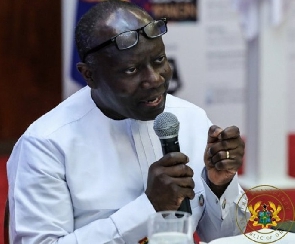The Minister for Finance designate, Ken Ofori-Atta has taken a swipe at the former Special Prosecutor Martin Amidu for his report on the controversial Agyapa transaction.
According to him, the decision by the anti-graft campaigner to put out the report without giving him the opportunity to respond was a disservice to him.
“There is a bit of cynicism around the Agyapa transaction. I think that for Martin Amidu’s report on it to be put out to the public without a chance by people like me to discuss it is a disservice,” Mr Ofori-Atta told Parliament’s appointments committee on Thursday during his vetting.
He added that the Agyapa deal will be resubmitted to parliament for it to be scrutinized before it is passed.
“We will resubmit it to parliament. The question, in this new normal, is what we do to leverage our natural resources. I hope we all come to terms with how we will capitalize and grow our transformation.”
The former Special Prosecutor Martin Amidu in a report last year described the Agyapa deal as one that was laced with corruption.
In his corruption risk assessment of the controversial deal, Mr. Amidu argued among other things that consultations over the agreement were not comprehensive and innovative enough.
He further disclosed that the selection and appointment of advisors for the agreement did not meet the “fundamentals of probity, transparency and accountability.”
The Special Prosecutor in his report took a swipe at the various officials who took part in the processes leading to the approval of the agreement.
According to him, the actors flouted several laws with impunity prior to the approval of the agreement.
“All the parties to the Mandate Agreement are deemed to have known the law but ignored it with impunity in signing and implementing the Mandate Agreement which is null and void ab initio as violating the Public Financial Management Act, 2016 (Act 921) and the Public Procurement Authority Procurement Act, 2003 (Act 663) as amended. This conduct which appears to have been in furtherance of the suspected bid-rigging, in the assessment of this Office severely lowered the risk of corruption, and rendered them a low-risk enterprise in the Agyapa Royalties Transactions process and their approval.
“It is with these new lenses that the analysis of the risk of corruption, and anti-corruption assessments of the legality of the engagement of the other services providers and underwriters on the recommendations of the Transaction Advisors acting as the Ministry of Finance’s procurement entity tender committee contrary to Part VI of the Public Procurement Act, 2003 (Act 663) as amended, and Sections 7 and 25 of the Public Financial Management Act, 2016 (Act 921) afore-quoted were made.”
About the Agyapa deal
Parliament on August 14th approved the controversial Agyapa Mineral Royalty Limited agreement with the government of Ghana despite a walkout by the Minority.
Two years ago, the House passed the Minerals Income Investment Fund Act 2018 which establishes the Fund to manage the equity interests of Ghana in mining companies, and receive royalties on behalf of the government.
The fund is supposed to manage and invest these royalties and revenue from equities for higher returns for the benefit of the country.
The law allows the fund to establish Special Purpose Vehicles (SPVs) to use for the appropriate investments. Last month, government introduced an amendment to the act to ensure that the SPVs have unfettered independence.
The approval will enable the country to use a special purpose vehicle, Agyapa Royalties Limited to secure about $1 billion to finance large infrastructural projects.
In line with that, Agyapa, which will operate as an independent private sector entity, will be able to raise funds from the capital market, both locally and internationally, as an alternative to the conventional debt capital market transactions.
The funds, which are expected to be raised from the Ghana Stock Exchange (GSE) and the London Stock Exchange (LSE), will be a long-term capital, without a corresponding increase in Ghana’s total debt stock and hence without a public debt repayment obligation.
General News of Thursday, 25 March 2021
Source: starrfm.com.gh

















